
HOME
INTRO
SYMBOLS
ALMANAC
ECONOMY
GEOGRAPHY
STATE MAPS
PEOPLE
FORUM
NEWS
COOL SCHOOLS
STATE QUIZ
STATE LINKS
BOOK STORE
MARKETPLACE
NETSTATE.STORE
NETSTATE.MALL
GUESTBOOK
CONTACT US


Texas State Play
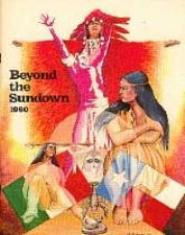
Texas State Play: Beyond the Sundown
[ Program ]
According to the Galveston Daily News, the inspiration for an official state play came after a meeting of the House of Representatives Subcommittee on Tourism. The topic of conversation; the Texas Sesquicentennial Celebration scheduled for 1986 that would mark the 150th anniversary of Texas' independence from Mexico.
On January 9, 1979 Senate Bill No. 93, authored by State Senator A.R. "Babe" Schwartz, was read for the first time.
It proposed that the historical outdoor drama, "The Lone Star," by Pulitzer Prize-winning dramatist Paul Green, be adopted as the official play of the State of Texas. After some minor changes, it was handily approved in the Texas Senate on April 24, 1979.
Schwartz
S.B. 93
A BILL TO BE ENTITLED
AN ACTrelating to an official state play; designating "The Lone Star" outdoor musical drama which is presented annually in the amphitheatre in Galveston Island State Park as an official play of the State of Texas; and declaring an emergency.
BE IT ENACTED BY THE LEGISLATURE OF THE STATE OF TEXAS;
SECTION 1. LEGISLATIVE FINDINGS. The Legislature of the State of Texas finds that:
(a) in 1821, Stephen F. Austin received a grant from Mexico to establish a colony in Texas for 300 families, this quota known as "the Old Three Hundred," with San Felipe de Austin on the Brazos serving as the seat of government; and
(b) in 1833, Stephen F. Austin traveled to Mexico City to present a state constitution and petition for reforms drafted at the Second Convention at San Felipe and was arrested and imprisoned by the Mexican President Santa Anna; and
(c) on March 2, 1836, a convention at Washington-on-the-Brazos declared Texas independent and named David G. Burnet president and Colonel Sam Houston commander-in-chief of the army; and
(d) on March 6, 1836, 187 Texans, commanded by Colonel William B. Travis, were besieged at the Alamo by 4,000 to 5,000 of Santa Anna's Mexican soldiers; and
(e) on April 21, 1836, Sam Houston's army routed the Mexican troops at the junction of the San Jacinto and Buffalo Bayou and captured Santa Anna; and
(f) this historic battle led to the independence of Texas and its later annexation to the United States; and
(g) the Lone Star Historical Drama Association, endorsed by the Daughters of the Republic of Texas and working cooperation with the Texas Parks and Wildlife Department, is proud of this stirring saga of the history of the state an presents an annual outdoor musical drama "The Lone Star" to reenact the founding of the Republic; and
(h) this outstanding moment in the history of our state and our nation as recreated in this annual outdoor drama is worthy of official recognition and encouragement.
SECTION 2. DESIGNATION AS STATE PLAY. The historical outdoor drama by Pulitzer-prize winning playwright Paul Green known as "The Lone Star," presented annually by the citizens of the State of Texas and the City of Galveston, is hereby designated and official play of the State of Texas.
SECTION 3. EMERGENCY. The importance of this legislation and the crowded condition of the calendars in both houses create an emergency and an imperitive public necessity that the constitutional rule requiring bills to be read on three several days in each house be suspended, and the rule is hereby suspended, and that this Act take effect and be in force from and after its passage, and it is so enacted.
When Senate Bill No. 93 moved into the Texas House of Representatives, "The Lone Star" found company. The House Committee on State Affairs decided to embellish the work of Senator Schwartz and composed a substitute bill that included three additional historical plays; the outdoor historical drama, "Texas," also by Paul Green; the outdoor historical drama, "Beyond the Sundown," by Kermit Hunter; and the outdoor historical musical, "Fandangle," created by Robert Nail.
By: Schwartz (McLeod) S.B. No. 93
Substitute the following for S.B. No. 93.
By: Grubbs C.C.S.B. No. 93
AN ACT
relating to the designation of official state plays.
BE IT ENACTED BY THE LEGISLATURE OF THE STATE OF TEXAS;
SECTION 1. The legislature finds that:
(1) the historic battles of San Jacinto, Goliad, and the Alamo that led to the independence of Texas are portrayed faithfully and artistically at Galveston Island State Park in the play, The Lone Star;
(2) the lives of early settlers of the Panhandle of Texas are portrayed colorfully and creatively each year at the Palo Duro Canyon State Park in the play, Texas;
(3) the relationship between early settlers of East Texas, especially General Sam Houston and the Alabama-Coushatta Indians, is portrayed historically and excitingly at the Alabama-Coushatta Indian Reservation in the play Beyond the Sundown; and
(4) the founding of Fort Griffin and the lived of the settlers of Shackleford County and Albany, Texas, during the 1870s and 1880s are depicted during the last two weeks in June annually in Shackleford County in the play Fandangle.
SECTION 2. The Lone Star, presented in Galveston Island State Park, Texas presented in Palo Duro Canyon State Park, Beyond the Sundown, presented at the Alabama-Coushatta Indian Reservation, and Fandangle, presented in Shackleford County, are designated official plays of the State of Texas.
SECTION 3. The importance of this legislation and the crowded condition of the calendars in both houses create and emergency and an imperative public necessity that the constitutional rule requiring bills to be read on three several days in each house be suspended, and the rule is hereby suspended, and that this Act tack effect and be in force from and after its passage, and it is so enacted.
The House substitute was approved by the Senate on May 25, 1979.
"Beyond the Sundown," by Kermit Hunter, was declared one of four official plays of the State of Texas when Governor William P. Clements signed Senate Bill No. 93 into law on June 6, 1979.
"Beyond the Sundown" missing in action
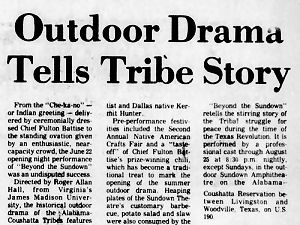
Texas State Play: Beyond the Sundown
The Cherokeean, May 31, 1979, Page Fourteen
"Beyond the Sundown" told the story of the involvement of the Alabama and Coushatta Indians in Texas' war for independence from Mexico through a combination of music, dancing and dramatic lighting.
BEYOND THE SUNDOWN dramatizes the moral dilemma that faced the peaceful Alabama-Coushatta Indians during the Texas struggle for independence from Mexico. The Tribes' decision whether to fight or to remain neutral and the choice of which "white men" to believe would affect the course of Texas history. The drama also depicts the timeless conflict between the zealous passion of youth and the staid wisdom of their elders.
("The Cherokeean" 14)
Like "The Lone Star," "Beyond the Sundown" is no longer in production. Its last performance was held in 1983.
Texas Law
The following information was excerpted from the Texas Statutes: Government Code, Title 11, Subtitle A, Chapter 3101, Section 3101.011.
TITLE 11. STATE SYMBOLS AND HONORS; PRESERVATION
SUBTITLE A. STATE SYMBOLS AND HONORS
CHAPTER 3101. STATE SYMBOLS
Sec. 3101.011. STATE PLAYS.
Sec. 3101.009. STATE PLAYS. The following plays are official state plays of Texas:
(1) The Lone Star presented in Galveston Island State Park;
(2) Texas presented in the Palo Duro Canyon State Park;
(3) Beyond the Sundown presented at the Alabama-Coushatta Indian Reservation; and
(4) Fandangle presented in Shackelford County.
Added by Acts 2001, 77th Leg., ch. 1420, Sec. 7.001, eff. Sept. 1, 2001.
Sources...
"House Bill No. 2812." The Legislature of the State of Texas. The State of Texas, 2005. Web. 27 Sep 2011.
"'Beyond the Sundown' Sets Opening Date for Season." The Cherokeean [Rusk] 31 May 1979, Ed. 1 14. Print.
"Texas Constitution and Statutes." The Legislative Reference Library of Texas. The State of Texas, 27 Sep 2011. Web. 27 Sep 2011.
Additional Information
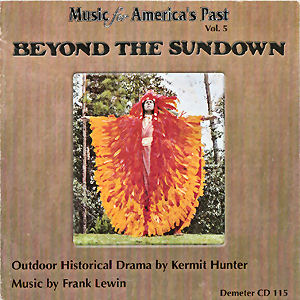
Music of "Beyond the Sundown," by Frank Lewin
ALABAMA-COUSHATTA INDIANS: Texas State Historical Association: The Handbook of Texas Online.
Alabama People: Wikipedia, the free encyclopedia.
Coushatta: Wikipedia, the free encyclopedia.
Alabama-Coushatta Indian Reservation: Facebook.
Other official plays of the State of Texas:
- "The Lone Star"
- "Texas"
- "Fandangle"
More symbols & emblems: Complete list of official Texas state symbols from NETSTATE.COM.
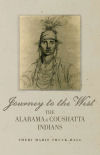
Journey to the West
Sheri Marie Shuck-Hall
Journey to the West: The Alabama and Coushatta Indians, by Sheri Marie Shuck-Hall. 304 pages. Publisher: University of Oklahoma Press; First Edition edition (November 15, 2008) In this book, Sheri Marie Shuck-Hall traces the gradual movement of the Alabamas and Coushattas from their origins in the Southeast to their nineteenth-century settlement in East Texas, exploring their motivations for migrating west and revealing how their shared experience affected their identity.
The first book to examine these peoples over such an extensive period, Journey to the West tells how they built and maintained their sovereignty despite five hundred years of trauma and change. Blending oral tradition, archaeological data, and archival sources, Shuck-Hall shows how they joined forces in the seventeenth century after their first contact with Europeans, then used trade and diplomatic relations to ally themselves with these newcomers and with larger Indian groups—including the Creeks, Caddos, and Western Cherokees—to ensure their continuing independence.
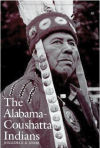
The Alabama-Coushatta
Indians
Jonathan Hook
The Alabama-Coushatta Indians, by Jonathan Hook. 208 pages. Publisher: Texas A&M University Press; 1st edition (November 1, 1997) What does it mean to be Indian today? Specifically, what does it mean to be an Alabama-Coushatta Indian living on a reservation in East Texas, geographically far from ancestral territory and removed in time and by the intervention of white missionaries and government agents from the traditions and lifestyles of one's forebears?
All of the most emotional issues among contemporary Southeast Texas Native Americans—including repatriation of remains, educational funding, health care, and cultural preservation—in some way address the question of personal identity. Difficulties in determining who and what are "Indian" continually divide the community, and analyzing the Alabama-Coushatta cultural transition is complicated by the dearth of written sources and the repression by 1930 of most overt evidence of the old ways. In this book Jonathan Hook engagingly discovers the earlier cultural tradition and the influences that caused it to evolve to its present form and conceptualizes those changes in a way that explores the very concept of identity.

